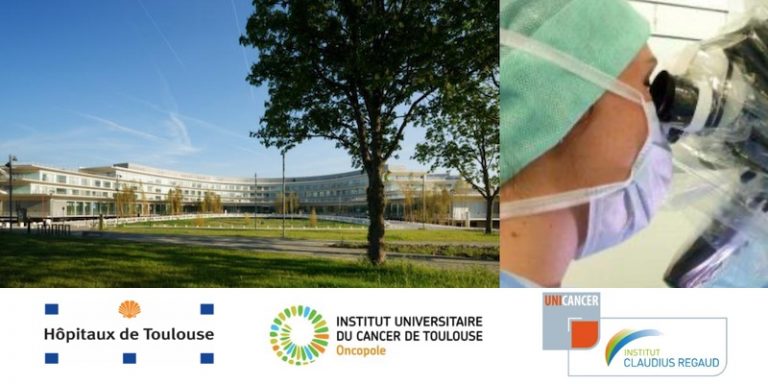
The APRIORICS project (Immunohistochemistry Enhanced Deep Learning for Breast Cancer Image Requalification) aims to use artificial intelligence to describe tumours as accurately as possible. Selected in the context of the Health Data Hub call for projects, it is being carried out by the Toulouse University Hospital in partnership with the Claudius Regaud Institute (ICR) within the University Cancer Institute of Toulouse-Oncopole (IUCT-O).
In its 2018-2022 establishment project, Toulouse University Hospital has positioned itself as a producer of health data and a user of artificial intelligence to build predictive models in order to diagnose pathologies more easily and earlier. This is 4P medicine: personalized, preventive, predictive and participatory.
The APRIORICS project, led by Toulouse University Hospital in partnership with the Claudius Regaud Institute (ICR) within the University Cancer Institute of Toulouse-Oncopole (IUCT-O), has been selected in the framework of the Health Data Hub’s call for projects “Artificial intelligence for an improved experience of the healthcare system”. APRIORICS aims to use artificial intelligence to describe tumours as accurately as possible.
Every year, about 1500 women are treated at IUCT-O for breast cancer, the most common cancer in France.
An essential contribution in the personalized care of breast cancer
The management of breast cancer is largely based on the microscopic description of tumours by the pathologist (who is responsible for the analysis of biological tissues). This examination makes it possible to characterize each breast cancer and guides the therapeutic decision. However, faced with the complexity and considerable variability of the microscopic aspect of breast cancers, the pathologist lacks the tools to accurately describe these tumours and summarizes the information contained in the microscopic images with a few undifferentiating criteria.
The aim of the APRIORICS project is to use artificial intelligence to describe tumours more precisely, extensively and intelligibly. It is a project that therefore directly concerns pathologists, but also oncologists and researchers.
APRIORICS involves the digitization of thousands of microscopic images of breast cancer in order to train algorithms to recognize the different constituents of tumors in order to better describe them. It will enable the continued development of personalized breast cancer management by improving diagnostic accuracy and reproducibility.
This project was made possible thanks to the human and material investment of the pathology laboratory in the field of artificial intelligence for more than 3 years.
It benefits from financial support from Bpifrance and technical support from the Health Data Hub (provision of computing capacity, data sharing). In addition, without the funding of the Toulouse Cancer Laboratory of Excellence (LaBex Toucan) and the Foundation for Medical Research (FRM) for the partnership with Thales services, this project would not have been possible.
The APRIORICS project will take shape in the first quarter of 2021 and will create a vast collection of microscopic breast cancer images annotated at the cellular level, from 1000 patients treated at the IUCT-O site.
A high-impact project, a technology that can be applied to other types of cancers
In addition to improving diagnosis and care, sharing the data produced with the Health Data Hub will open up new research and development opportunities for many researchers and manufacturers.
Corresponding to a major and unique contribution in the field of artificial intelligence on microscopic images of cancer, the development of the APRIORICS project will involve the publication of the collection of annotated digital slides and the results obtained in one or more high-impact international journals. This collection is intended to be made public under an open source licence according to the FAIR data principles, which ensure that the data is accessible and reusable. It will have a strong potential for reuse and citation through further work.
In addition, sharing via the Health Data Hub will focus on image processing algorithms and pre-trained artificial neural networks, allowing anyone to replicate the same type of approach on pathologies other than breast cancer, further amplifying the impact of the APRIORICS project. The user interface will correspond to a full web-based modular application for viewing and editing results. It may also be developed in the form of a patent or licence.
These different aspects will be coordinated by the Valorisation Unit of the Research and Innovation Department (DRI) of the Toulouse University Hospital.
A multidisciplinary team of the IUCT-O at work
This project is led by the Toulouse University Hospital, whose pathology laboratory, located at the IUCT-O, works in close collaboration with its partner, the Claudius Regaud Institute, which coordinates the senology care pathway. With a solid experience in digital pathology, the project team is composed of the following services:
- the pathology laboratory of the IUCT-O, with Dr Camille Franchet, senopatologist and project coordinator (ICR) and Pr Pierre Brousset, head of department (CHU of Toulouse),
- the laboratory’s image analysis technicians and engineers,
- the Imag’IN platform of the IUCT-O, integrated in the pathology lab, expert in the digitization of microscopic slides,
- the Information System and Organisation Department (DSIO) of the University Hospital,
- the Research and Innovation Directorate (DRI) of the CHU and the ICR,
- the Cancer Biological Resource Centre (CHU).
Translated from Focus sur le projet APRIORICS de l’IUCT-O Toulouse : IA et médecine personnalisée pour lutter contre le cancer du sein









